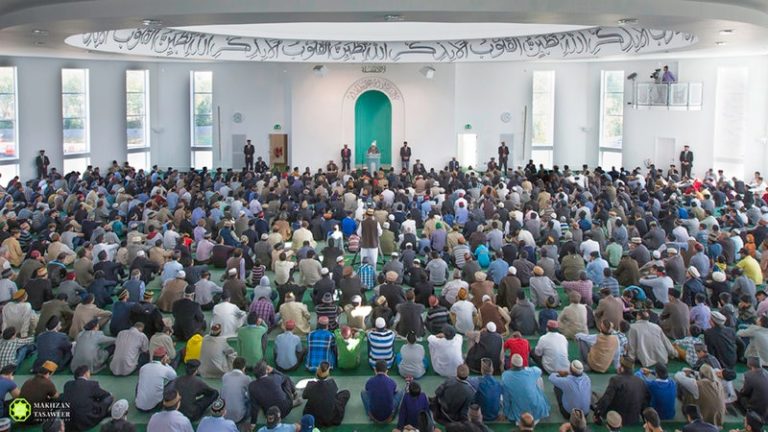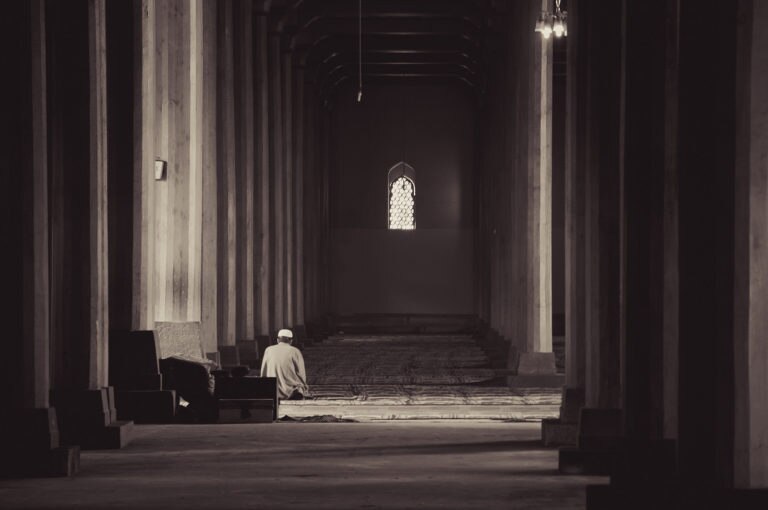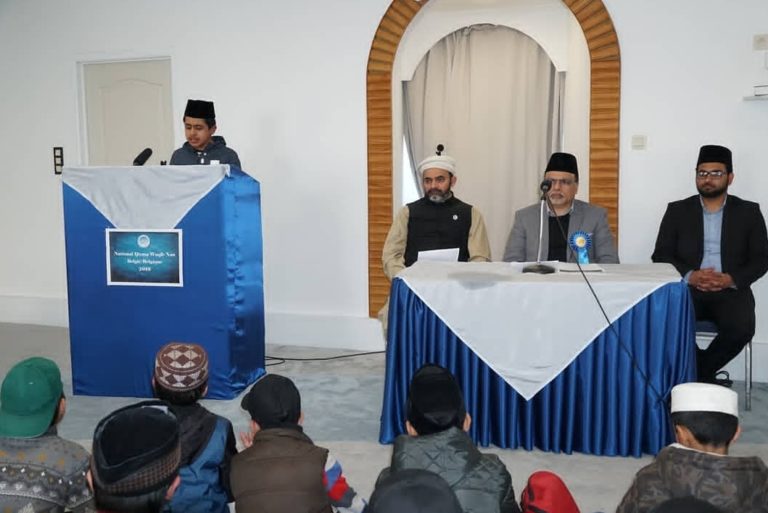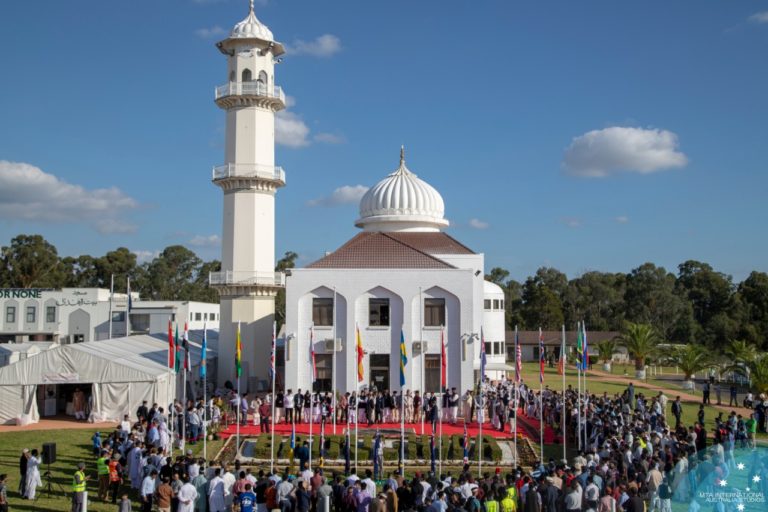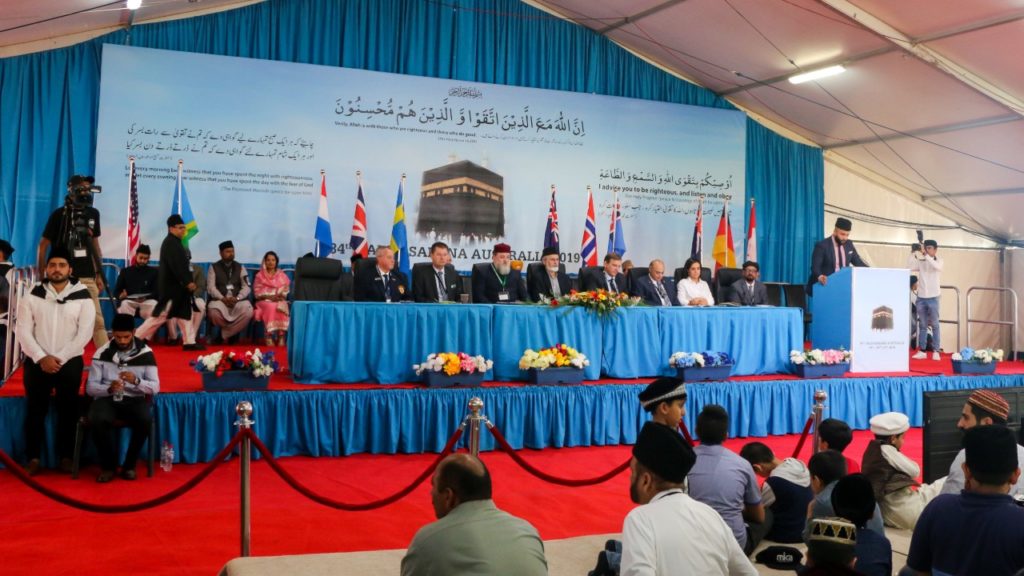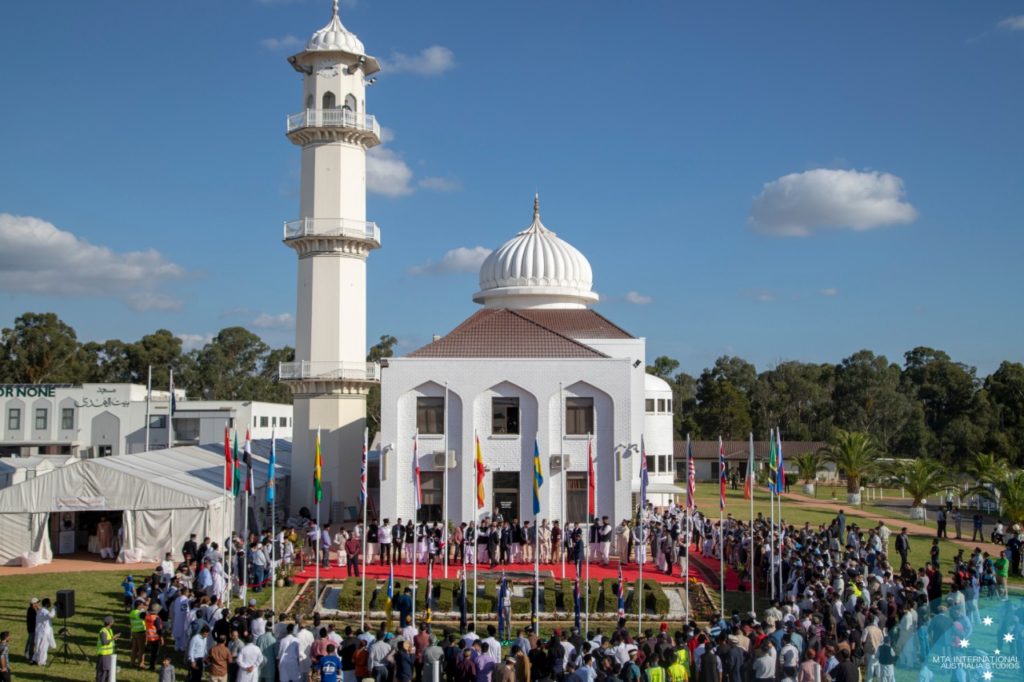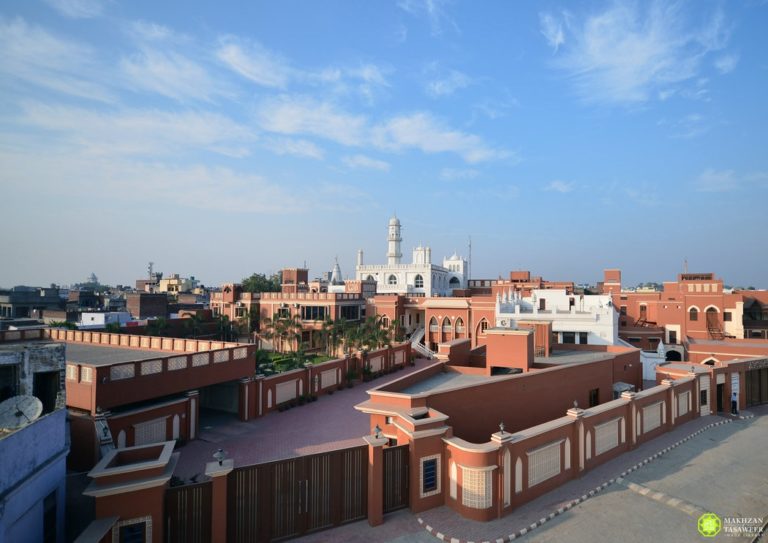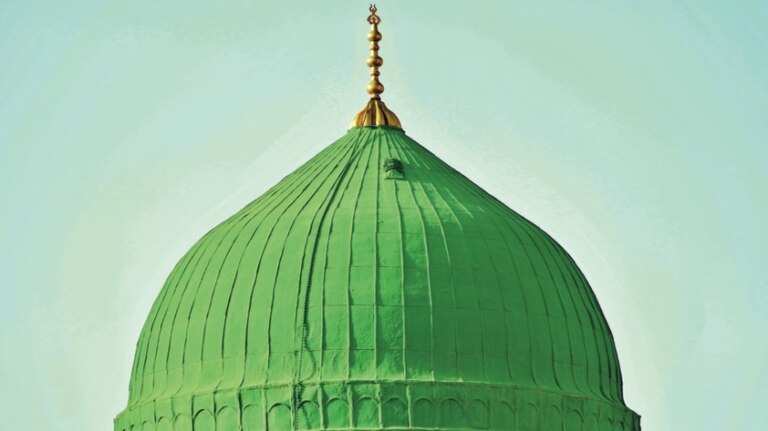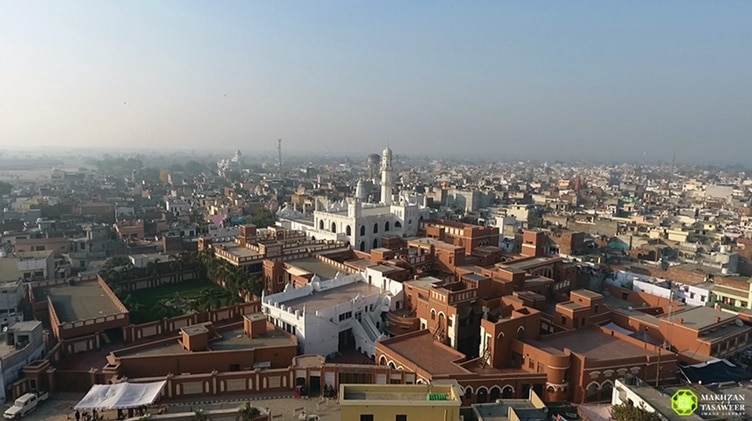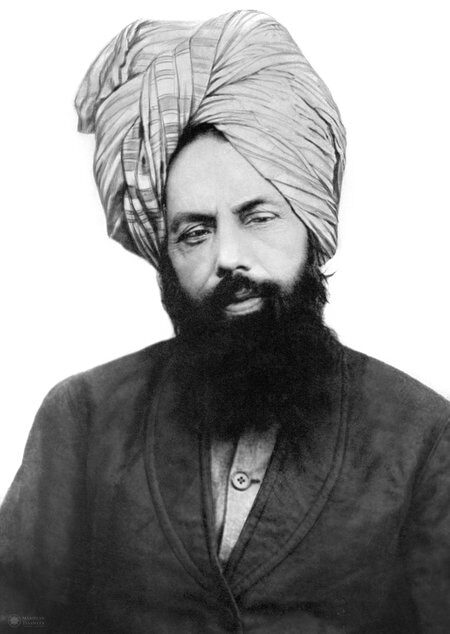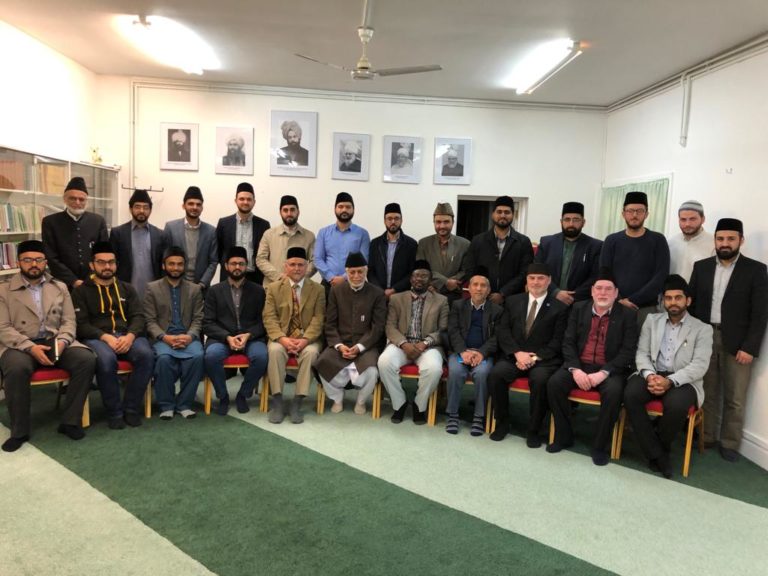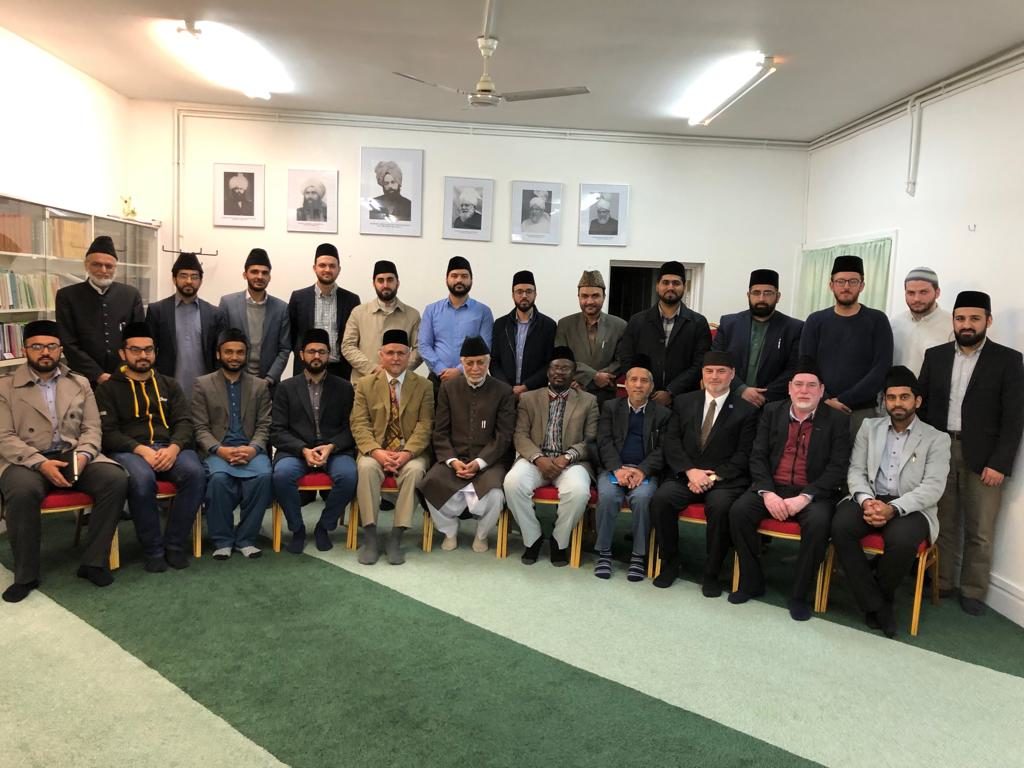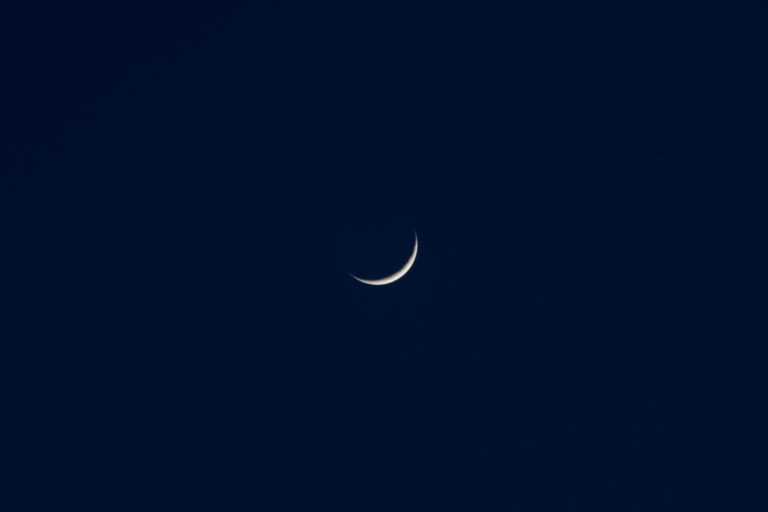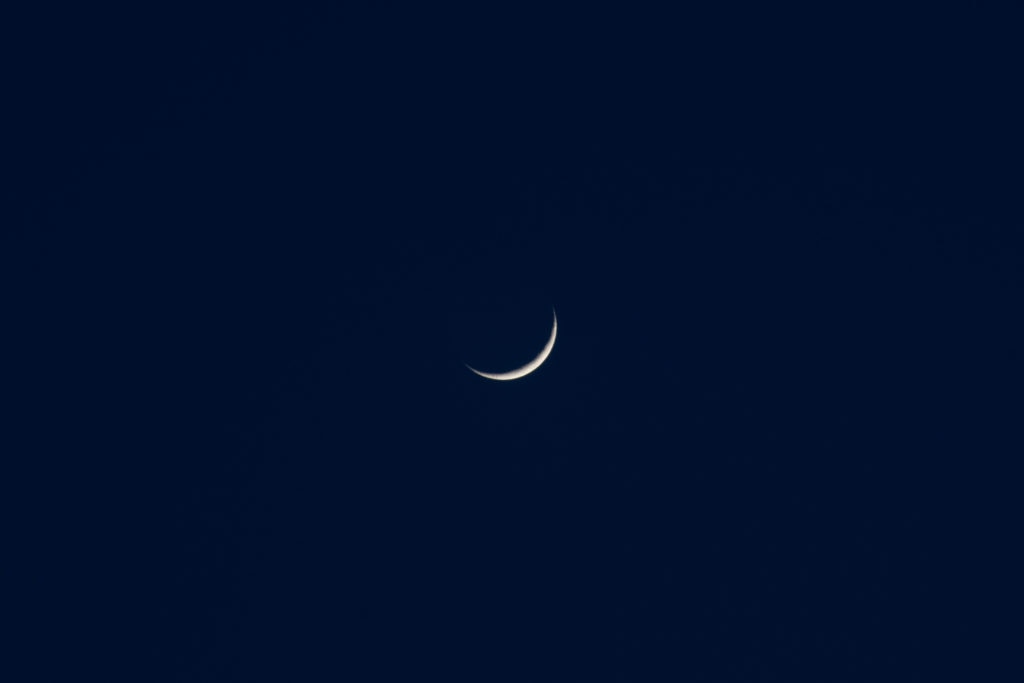Friday Sermon
19 April 2019
Delivered from Baitul Futuh Mosque
Men of Excellence
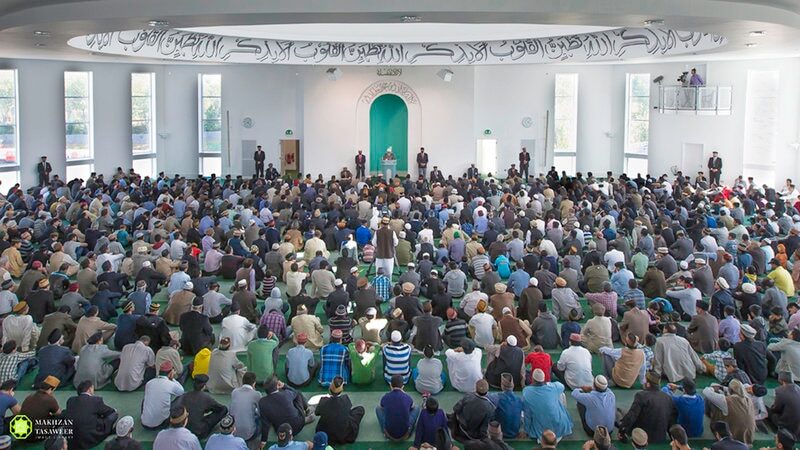
After reciting the Tashahud, Ta‘awuz, and Surah al-Fatihah, Hazrat Khalifatul Masih Vaa stated:
The Badri companion whose account I will mention today is Hazrat Usmanra bin Mazoonra. His title was Abu Saaib. Hazrat Usman’s mother’s name was Sukhailah bint Anbas. Hazrat Usmanra and his brother Hazrat Qudamahra were of similar appearance. He belonged to the Banu Jummah tribe of the Quraish of Mecca. (Al-Tabaqaat-ul-Kubra li ibn Sa‘d, Vol. 3, pp. 305-306, Usmanra bin Mazoon, Dar-ul-Kutub al-Ilmiyyah, Beirut, 1990)
The account of Hazrat Usmanra bin Mazoon’s acceptance of Islam is as follows:
Hazrat Ibn Abbasra narrates that once while the Messengersa of Allah was sitting in the courtyard of his house in Mecca, Hazrat Usmanra bin Mazoon passed by. He smiled as he saw the Holy Prophetsa. The Messengersa of Allah said to him, “Would you not like to take a seat?” Hazrat Usmanra replied, “Indeed, why not!” Thus, he came and sat down in front of him. Whilst in conversation, the Holy Prophetsa suddenly looked up. He looked at the sky for a moment and then began lowering his gaze slowly, until he was looking continuously towards his right.
He turned his face away from Usman, who was sitting before him and began looking towards the other direction and then he lowered his head. During this incident, the Holy Prophetsa was nodding his head so as to indicate as if he was trying to understand something. Hazrat Usmanra bin Mazoon, who was sitting next to him, observed all of this. After a short while, the Messengersa of Allah finished – when he came out of that state, or came out of the state in which it seemed as if something was being revealed to him, although Hazrat Usmanra was unaware of what exactly had been revealed. Once the Holy Prophetsa had understood what had been said to him, his eyes rose towards the sky once again as it did before. His gaze was following something until that object disappeared from the sky. After this, the Holy Prophetsa turned to Hazrat Usmanra bin Mazoon as he did previously. Hazrat Usmanra said, “What was the reason of my coming and sitting with you?” Hazrat Usmanra further said, “I have never seen you act in the manner as you did today.” Upon this, the Holy Prophetsa said, “What did you see me do”. Hazrat Usman bin Mazoonra replied, “I saw your eyes rising towards the sky. Then you looked towards your right and fixed your gaze in that direction, taking no notice of me. You then began nodding your head as if you were trying to understand what was being said to you.” The Holy Prophetsa asked, “Did you really observe this?” Hazrat Usmanra bin Mazoon replied in the affirmative. Upon this, the Holy Prophetsa said, “While you were sitting next to me, a messenger from Allah came to me and brought me a message.” Hazrat Usmanra bin Mazoon asked: “A messenger from Allah?” The Holy Prophetsa answered, “Yes.” Hazrat Usmanra asked: “What did he say?” The Holy Prophetsa replied, “He said:
إِنَّ اللّٰهَ يَأْمُرُ بِالْعَدْلِ وَالْإِحْسَانِ وَإِيْتَآءِ ذِي الْقُرْبٰى وَيَنْهٰی عَنِ الْفَحْشَآءِ وَالْمُنْكَرِ وَالْبَغْيِ ۚ يَعِظُكُمْ لَعَلَّكُمْ تَذَكَّرُوْنَ
(‘Verily, Allah enjoins justice, and the doing of good to others; and giving like kindred; and forbids indecency, and manifest evil, and wrongful transgression. He admonishes you that you may take heed.’)
Hazrat Usmanra bin Mazoon says, “This was the time when faith was truly embedded in my heart and I began to love Muhammadsa.” (Musnad Ahmad bin Hanbal, Vol. 1, p. 807, Musnad Abdillah bin Abbas, Hadith 2921, Alamul Kutub, Beirut, 1998)
In relation to the initial period after the Holy Prophetsa made his claim to prophethood, Hazrat Musleh-e-Maudra says:
“In the early stages of that period, the Holy Prophetsa received companions such as Talhara, Zubairra, Umarra, Hamzara and Usmanra bin Mazoon and each one of them was completely devoted to the Holy Prophetsa. Each and every one of them was prepared to sacrifice his life for the sake of the Holy Prophetsa. Undoubtedly, the Holy Prophetsa suffered and endured difficulties, trials and hardships for 13 years. However, the Holy Prophetsa was reassured by the fact that a group of intellectuals, people of stature and righteous and purified individuals from among the people of Mecca had already accepted him and that the Muslims were now considered to be a great force. Whenever an individual said that the Holy Prophetsa was insane – God forbid – some other associates of that individual would say to him that if he is insane then why would such and such person, who is considered to be intelligent and wise, accept him? This was such a reply that could simply not be.”
“Orientalists have tried their level best to criticise the Holy Prophetsa. They raise many allegations against him and at times, they do not even refrain from profanities.” The same is the case even today. “However, whenever Abu Bakr is mentioned, they say that Abu Bakr was a very selfless person. In relation to this, various other orientalists have mentioned that how is it possible for Abu Bakr to have accepted a liar.” If one praises Abu Bakr, then the person whom he accepted is most certainly also praiseworthy. “If Abu Bakr was selfless then why did he accept such a greedy individual and if he was truly selfless then one must acknowledge that his master was also selfless. This is a great argument which cannot be refuted.”
Hazrat Musleh-e-Maudra has also mentioned this in relation to the Promised Messiahas. He states, “Even with regard to the Promised Messiahas we find that people call him ignorant. However, in order to refute such allegations, God Almighty provided such means that Hazrat Khalifatul Masih Ira accepted him right from the outset of his claim. Maulvi Muhammad Hussain Batalvi was also among those who praised the Promised Messiahas prior to his claim. Following this, when the Promised Messiahas announced his claim to the world, God Almighty raised a group of intellectuals, who immediately accepted the Promised Messiahas. These intellectuals were from amongst the scholars, leaders as well as from amongst the English-speaking people.”
Hazrat Musleh-e-Maudra states regarding this, “Awe and admiration is formed through any of the three means; through faith, through knowledge or through wealth. God Almighty has blessed the community of the Promised Messiahas with all three of these means.” (Tafsir-e-Kabir, Vol. 9, pp. 139-140)
God Almighty also provided the Promised Messiahas with such companions from the beginning, who were held in high esteem by the world. As a matter of fact, the skill and knowledge of Hazrat Khalifatul Masih Ira as a physician are praised even today. Even non-Ahmadi physicians use his prescriptions and write about them. Nevertheless, at the time of the Holy Prophetsa, people from all sections of society accepted him and these included individuals from highly respected households and families.
In relation to the rancour and resentment of the disbelievers of Mecca, Hazrat Musleh-e-Maudra states:
“God Almighty provided such means that the hearts of the disbelievers continued to burn and were reduced to ashes. They failed to comprehend how to extinguish this fire. There was not a single family of high status, whose members had not fallen in servitude to the Holy Prophetsa. Hazrat Zubairra belonged to a family of high status as did Hazrat Talhara. Hazrat Umarra belonged to a noble family and so too did Hazrat Usmanra. Hazrat Usmanra bin Mazoon belonged to a family of high status. Similarly, Hazrat Amrra bin Aas and Khalidra bin Waleed, who accepted Islam at a later stage, belonged to the noblest of families in Mecca. Aas was an opponent of Islam, however his own son, Amr, accepted Islam. Waleed was also an opponent, yet, [his son] Khalid accepted Islam.”
Hazrat Musleh-e-Maudra further writes,
“In short, thousands of people were fierce opponents of Islam. Yet, their offspring fell at the feet of the Holy Prophetsa and raised their swords against their fathers and relatives in the battlefield.” (Tafsir-e-Kabir, Vol. 9, p. 588)
We find mention of Hazrat Usmanra bin Mazoon’s migration to Abyssinia as well as his return to Mecca. As it has already been mentioned, Hazrat Usmanra bin Mazoon was amongst the first converts to Islam. According to Ibn Ishaq, he accepted Islam after 13 individuals. He and his son, Saib, participated in the first migration to Abyssinia along with a group of Muslims. During his stay in Abyssinia, when he heard the news that the Quraish had accepted Islam, he returned to Mecca.
Ibn Ishaq narrates that when the migrants to Abyssinia received news about the Meccans having prostrated with the Holy Prophetsa, they started making their journey back. (I have already given the details of this in a previous sermon.) Many others had joined them in this migration, and the reason for their return was that they thought that all the disbelievers of Mecca had accepted the Holy Prophetsa. When they reached near Mecca, they learned the truth of the matter. At that moment, travelling back to Abyssinia appeared too difficult a task for them. According to some other narrations, it is also said that some people did in fact go back to Abyssinia, fearing entry into Mecca without coming under someone’s tribal protection.
Nonetheless, some of them stayed there until each and every one of those who remained came under the protection of a Meccan local, meaning that they each took the tribal protection of a local person before entering Mecca – they waited until someone from Mecca gave them refuge and safe entry to come back.
Hazrat Usmanra bin Mazoon came under the protection of Waleed bin Mugheerah. Ibn Ishaq relates that when Hazrat Usmanra saw that the Holy Prophetsa and his companionsra were enduring great troubles – that people were being beaten and great cruelties inflicted upon them, all the while he [i.e. Hazrat Usmanra] spent day and night in peace under the protection of Waleed bin Mughirah, (he was a non-Muslim chief among the chieftains of Mecca, and Usman had come under his protection).
Seeing all this, Hazrat Usmanra said to himself, “By God, my night and my day is passing in peace under the protection of an idolater, while my friends and family are being tormented with agonising persecution! There is surely something wrong with me.” He went to Waleed bin Mugheerah and said, “O Abdus Shams! (This was the title of Waleed bin Mugheera) “You have fulfilled your duty of granting protection. I was under your protection. Now I desire to leave this protection and go to the Holy Prophetsa, because there is a role model for me in the Holy Prophetsa and his companionsra.”
Waleed said, “O my nephew… (Waleed was a close friend of Usman’s father) … perhaps this protection of mine has caused you some harm or you have been dishonoured in some way?”
Hazrat Usmanra responded, “No, but I am content with the protection of Allah. I now leave your protection, for I am well-pleased with God’s protection and do not desire the refuge of any other besides Him.”
Waleed said, “Then come with me to the Ka‘bah and openly announce that you’re leaving my protection, just like I openly announced giving you protection.”
Hazrat Usmanra replied, “Very well, let us go.” They both proceeded to the Ka‘bah. Weleed announced, “This is Usman, who has come to renounce the protection I had given him.” This was announced before the people.
Hazrat Usmanra added, “He is telling the truth. Surely, I have found him to be true to his promise and honourable in providing protection,” (referring to Waleed) “But now I do not wish to remain in the protection of anyone other than God Almighty, so I have renounced Waleed’s protection and returned it to him.” After this, Hazrat Usmanra returned. (Usdul Ghaba, Vol. 3, pp 589-590, Usman bin Mazoonra, Dar-ul-Kutub al-Ilmiyyah, Beirut, 2003)
The mention of this migration to Abyssinia has been stated previously as well in reference to other companions. I shall present in summary what Hazrat Mirza Bashir Ahmadra has written, referring to various historical sources:
“When the suffering of the Muslims had reached its limit and the Quraish continued to aggravate the affliction of the Muslims, the Holy Prophetsa instructed Muslims to migrate to Abyssinia, and said, ‘The king of Abyssinia is just and equitable. None are subjected to oppression under his rule.’ The country of ‘Habshah’, which is known as Ethiopia or Abyssinia in the English language, is situated to the north-east in the continent of Africa. It is exactly opposite southern-Arabia and with the exception of the Red Sea, no country intercedes it. During that era a strong Christian sovereignty was established in Abyssinia and the king was referred to as the Negus. As a matter of fact, the ruler there is still called upon by the same name.” (This was when Mian Bashir Sahib wrote this.) “Arabia had business relations with Abyssinia. During that time, the personal name of the Negus was Ashamah, who was a just, intelligent and powerful king. In any case, when the pains of the Muslims reached their limits, the Holy Prophetsa instructed that those who could afford should migrate to Abyssinia.
“Therefore, upon the instruction of the Holy Prophetsa, in the month of Rajab 5 Nabawi, eleven men and four women migrated to Abyssinia. The well-known names among them were as follows: Hazrat Usman bin Affanra and his wife Ruqayyahra the daughter of the Holy Prophetsa, Abdur-Rahmanra bin Auf, Zubairra bin Al- Awwam, Abu Hudhaifahra bin Utbah, Usman bin Mazoonra, Mus‘ab bin Umairra, Abu Salamahra bin Abdul-Asad and his wife Umm-e-Salamah.”
He further writes:
“It is very strange that a majority of these pioneer immigrants were those who belonged to powerful tribes of the Quraish, and the weaker were few and far between. This illustrates two things: firstly, even those who belonged to the powerful tribes of the Quriash were not safe from the cruelties of the Quraish. Secondly, weak people such as slaves, etc., at that time were in such a grave state of weakness and misery that they were not even able to migrate.” (Sirat Khatamun-Nabiyyin, Hazrat Mirza Bashir Ahmadra, pp. 146-147)
Hazrat Musleh-e-Maudra has related this incident in his own manner. Whilst describing Hazrat Usmanra bin Mazoon’s seeking of protection in Mecca and the incident of Labeed bin Rabeeah, he writes (it has already been mentioned that Hazrat Usman renounced the protection of Waleed):
“When the atrocities committed by the Meccans had reached their pinnacle, one day the Holy Prophetsa summoned his Companions and said, ‘There is a land to the West, after crossing the sea where such injustices are not committed, due to the worship of Allah being performed and where people are not killed due to their change in religion. Therein resides a just king. Migrate there, perhaps you shall find greater ease and security.’
“A number of men, women and children migrated to Abyssinia in accordance with this instruction, but it was not an ordinary matter for them to leave Mecca. It had a deep emotional aspect to it as the Meccans considered themselves the custodians of the Ka‘bah, and therefore, it was unbearable for them to leave Mecca. Only such a man could say that he would leave Mecca, who has no resting place left in the world. Hence, it was an extremely painful episode for these people to migrate and on top of that they had to leave in secrecy. They migrated quietly because they knew that if the Meccans came to know of it, they would not allow them to migrate. So for this reason, they were not able to even say their final farewells to their dear ones. They did not even have the chance to meet their close ones as they were forced to leave secretly. The state of their hearts was such that the onlookers, who realised they were outsiders and why they were migrating, would also be affected by their pain.
“Hence, when this caravan was departing, Hazrat Umarra, who at the time was a disbeliever, a staunch enemy of Islam and was among the foremost to cause the Muslims to suffer, coincidentally met members of this caravan. Among them was also a companion by the name Umm-e-Abdillah. When Hazrat Umarra saw their goods tied up and their riding animals prepared, he understood that these people were leaving Mecca. He said, ‘O Umm-e-Abdillah, this all seems to be preparation for migration.’ Umm-e-Abdillah replied, ‘By God, we are departing to another land for you have caused us much suffering and committed grave atrocities against us. We shall not return to our land until God Almighty brings about the means for ease and comfort.’ Umm-e-Abdillah says that Hazrat Umarra answered, ‘Indeed, may God be with you.’ She then says, ‘I felt a tenderness in his voice even though at the time he was an opponent of the Muslims. Despite this, he was filled with emotions as he witnessed them migrating. He said God be with you and his voice was one of tenderness which I had never felt before. He then turned away quickly and went on his way, (i.e. Hazrat Umarra left them) and I felt that he was very sad and sorrowful after witnessing what he did.’
“In any case, when the Meccans were made aware of their migration, they pursued them and continued to chase them right up to the sea. However, prior to their arrival at the sea the Muslims had already departed for Abyssinia. The Meccans heard news of this and decided to send a delegation to the king of Abyssinia in an attempt to turn him against the Muslims and to also persuade him to hand them over to the Meccans. Hence, this delegation went to Abyssinia and met the king, having instigated the nobles of the courtyard. However, God Almighty had strengthened the heart of the king and despite all the insistence of the courtiers, who had been influenced by the Meccans, and despite them telling him to hand the Muslims over to the Meccans, (even the courtiers were colluding to hand over the Muslims), he refused to hand the Muslims over to the disbelievers. When this delegation was unsuccessful and returned to Mecca, the Meccans contrived a plan to call Muslims back. They spread rumours among some of the caravans travelling to Abyssinia that everyone in Mecca had embraced Islam. The majority of Muslims returned to Mecca upon hearing this news; however, after their arrival, they came to know that this news was disseminated mischievously and was utterly false. When the Muslims came to know of this, (as it has been mentioned before) some returned to Abyssinia and others stayed in Mecca.”
Hazrat Musleh-e-Maudra further writes:
“Hazrat Usmanra bin Mazoon was among those who remained behind in Mecca. He was the son of a very wealthy person. This time around Waleed bin Mugheerah, a friend of his father, granted refuge to Hazrat Usmanra and he started to live in Mecca safely. However, during this time, Hazrat Usmanra observed that some other Muslims were facing severe persecution. Since he was an honourable young man, he met Waleed and stated, ‘I no longer require your protection because I cannot bear the fact that other Muslims endure such hardships and I live comfortably.’ Therefore, Waleed announced, “Usman is no longer under my protection.’ After this, Labeed, a famous poet of Mecca, was once presenting his poetry to the wealthy Meccans. He recited the following verse:
وَکُلُّ نَعِیْمٍ لَا مَحَالَۃَ زَائِلٌ
“Meaning, ‘every bounty will ultimately come to an end.’ Hazrat Usmanra responded, ‘This is false, the bounties of paradise are everlasting.’ Labeed, who was an influential person, became infuriated after hearing this response. He said, ‘O People of the Quraish! Your guests were never humiliated in such a manner previously. Since when has this new custom started?’ Someone responded, ‘This person is foolish. Do not mind what he says.’ Hazrat Usmanra insisted on his stance and stated, ‘There is nothing imprudent about what I said. It is the truth.’ Upon hearing this, a person stood up and punched Hazrat Usmanra on his face due to which he either lost his eye, or it swelled up. Waleed, who had granted protection to Hazrat Usmanra before, was sitting in this gathering. He was a close friend of Hazrat Usman’sra late father. Waleed could not endure the present condition of the offspring of his deceased friend. However, according to the Meccan traditions, he could not support Hazrat Usmanra at all because he was no longer under his protection. He was not able to do anything; however, he addressed Hazrat Usmanra and said with immense pain, ‘O my nephew! By God, your eye could have been saved from such suffering. You were under superior protection’ (meaning Waleed’s guardianship) ‘but you renounced it of your own accord and had to witness this day.’
“Hazrat Usmanra replied, ‘I desired for how I have been treated. You lament over my injured eye, whereas my other eye yearns for the same fate.’”
Hazrat Musleh-e-Maudra goes on to write:
“While addressing Waleed, Hazrat Usmanra said, ‘The example of Muhammad, the Messengersa of Allah, is sufficient and complete for me. If he is enduring hardship, then why should I not suffer as well? The support of God is sufficient for me.’” (Dibacha Tafsir-ul-Quran, Anwarul Ulum, Vol. 20, pp. 202-205)
This incident regarding Hazrat Usmanra bin Mazoon and Labeed bin Rabeeah, who was a famous Arab poet, is also found in the books of history as per the following:
“Labeed bin Rabeeah was a well-known poet among the Arabs and used to sit in the gatherings of the Quraish, (as has been mentioned earlier). Hazrat Usmanra also came and sat with him. Labeed read aloud the first line of a couplet,
اَلَا کُلُّ شَیْءٍ مَّا خَلَا اللّٰہَ بَاطِلٌ
‘Beware! Everything is finite except Allah.’ Hazrat Usmanra replied, ‘You have spoken the truth. Upon this, Labeed continued the rest of the couplet:
وَکُلُّ نَعِیْمٍ لَا مَحَالَۃَ زَائِلٌ
‘Every bounty will ultimately come to an end.’
“Hazrat Usmanra replied, ‘You have spoken a lie.’ People looked at Hazrat Usmanra and told Labeed to repeat what he had said, at which Labeed repeated. Again Hazrat Usmanra testified to the truth of the first couplet, and called the second one a lie, contending that the rewards of paradise are endless. Labeed, the Poet, began saying, ‘O people of the Quraish! Your gatherings were not always like this.’
“A foolish man from among them stood up and slapped or punched Hazrat Usmanra in the eye, which made his eye go blue, or caused it to swell up. The people present around him said, ‘By God, you were under a strong protection and your eye was safe from the injury it has sustained.’ Hazrat Usmanra responded, ‘The protection of Allah is stronger and more honourable, and my other eye is also desirous of the same affliction as this eye has endured. It is compulsory for me to adopt the way of the Holy Prophet Muhammadsa and his companionsra.’
“Waleed said, ‘What harm was there for you in my protection?’ Hazrat Usmanra responded, ‘Aside from the protection of Allah, I do not need any other protection.’” (Usdul Ghaba, Vol. 3, p. 590, Usman bin Mazoonra, Dar-ul-Kutub al-Ilmiyyah, Beirut, 2003)
This was the condition of the faith of these people, and this was the pain that they had for their companions as well which was that if they were suffering, then why should the others remain deprived of this. They indeed had a strong bond of love with the Holy Prophetsa and could not bear to see him in pain, however they could not bear to see even their fellow companions suffering.
Hazrat Musleh-e-Maudra states,
“The reason why Hazrat Usmanra bin Mazoon gave such a response was because he had heard and read the Holy Quran and was aware of the teachings of Islam. Thus, he did not deem any other work of poetry to have any significance.”
In fact, later Labeed also accepted Islam. Hazrat Musleh-e-Maudra further states:
“Upon accepting Islam, Labeed also adopted the same practice. For instance, once Hazrat Umarra sent a message to one of his governors and asked him to send any newly composed works of poetry from some of the reputable and well-known poets. Labeed, who had become a Muslim by then, was also requested to present his work and subsequently he wrote a few verses from the Holy Quran and sent them.”
The deep love and bond Hazrat Usmanra bin Mazoon had with the Holy Prophetsa can be also be gauged from the following account. In one of the narrations it states that upon his demise, the Holy Prophetsa kissed him and whilst doing so tears were flowing from his eyes.
When the Holy Prophet’s son, Ibrahim passed away, the Holy Prophetsa stood next to his body and said:
اَلْحِقْ بِسَلَفِنَا الصَّالِح عُثْمَانَ ابْنَ مَظْعُوْنَ
“May you be in the company of our righteous and dear friend, Usmanra bin Mazoon.’” (Fada’il-ul-Qur’an 4, Anwarul Ulum, Vol. 12, p. 456)
The account of Hazrat Usmanra bin Mazoon’s migration has been narrated as follows:
Upon migrating, Hazrat Usmanra bin Mazoon, Hazrat Qudamara bin Mazoon, Hazrat Abdullahra bin Mazoon and Hazrat Saibra bin Usman stayed at the house of Hazrat Abdullahra bin Salama Ajalani. According to another narration, they all stayed at the house of Hazrat Hizamra bin Wadiya.
Muhammad bin Umar Waqadi relates: “The tribe of Mazoon were amongst those people whose entire family, men and women alike, gathered together and migrated and not a single person remained behind. Hazrat Umme Ala‘ara relates that when the Holy Prophetsa migrated to Medina along with the other Muhajireen, it was the desire of every Ansari that they stay in their home. Thus, a lot was drawn for this and Hazrat Usmanra bin Mazoon was allocated to stay in our home. The Holy Prophetsa established a bond of brotherhood between Hazrat Usmanra bin Mazoon and Hazrat Abu Haitham bin Taihanra.” (Al-Tabaqaat-ul-Kubra li ibn Sa‘d, Vol. 3, pp. 302-303, Dar-ul-Kutub al-Ilmiyyah, Beirut, 1990)
Hazrat Usmanra bin Mazoon migrated to Medina and also participated in the Battle of Badr. Out of all the people, Hazrat Usmanra bin Mazoon prayed with the most passion, he would observe the fast in the day and would worship in the late hours of the night. He would safeguard himself from carnal desires and would always keep away from women. Hazrat Usmanra bin Mazoon sought permission from the Holy Prophetsa to lead a life in complete seclusion from the world and to lead a life of complete celibacy, however the Holy Prophetsa prohibited him from doing this. This has been mentioned in Usdul Ghaba, a book of Islamic history. (Usdul Ghaba, Vol. 3, p. 590, Usman bin Mazoon, Dar-ul-Kutub al-Ilmiyyah, Beirut, 2003)
In one of the narrations, it states that once Hazrat Usmanra bin Mazoon’s wife went to meet the noble wives of the Holy Prophetsa. Upon seeing her in a dishevelled state with her clothes unclean and hair unkempt, they enquired why she was in such a state. They advised her to be more presentable because amongst the people of Quraish, there was no one wealthier than her husband. Thus, since it was not a question of her not being able to afford it as her husband was financially affluent, therefore they advised her to be more presentable. Hazrat Usmanra bin Mazoon’s wife responded to the noble wives of the Holy Prophetsa, who were all sat together, that Hazrat Usmanra bin Mazoon did not have any desire for her. She said, “He prays to God Almighty all night and gives me no attention and he fasts during the day.” When the Holy Prophetsa entered the house, his wives informed him of her situation. Upon hearing what Hazrat Usmanra bin Mazoon’s wife had said, the Holy Prophetsa went to see him and said, “Am I not a model for you to follow?” Hazrat Usmanra bin Mazoon replied, “May my parents be sacrificed for your sake! What has happened? I strive my utmost to emulate your example.” The Holy Prophetsa replied, “Do you fast during the day and worship all night?” Hazrat Usmanra bin Mazoon replied in the affirmative. Upon this, the Holy Prophetsa instructed him not do so and said, “Your eyes have a right over you; your body has a right over you; your family has a right over you and your wife and children have a right over you. Therefore, you may pray indeed, but it is also important to sleep.” One should awaken in the night to offer their voluntary prayers, but it is also important to sleep. “If you keep voluntary fasts then you should not keep them consecutively but should have intervals between the fasts.”
After having spoken to Hazrat Usmanra bin Mazoon, sometime later his wife went again to the meet the noble wives of the Holy Prophetsa and was wearing perfume as if she had prepared herself to be a bride. They enquired as to why she had made such an effort to adorn herself, to which she replied that she had also been granted what other women had i.e. the attention of her husband. (Al-Tabaqaat-ul-Kubra li ibn Sa‘d, Vol. 3, p. 302, Dar-ul-Kutub al-Ilmiyyah, Beirut, 1990)
In relation to this there is a narration from Hazrat Aishara in which she states that the Holy Prophetsa called for Hazrat Usmanra bin Mazoon and said, “Do you dislike my practise?” Hazrat Usmanra bin Mazoon replied, “O Messengersa of Allah! Certainly not, in fact I am always seeking to adopt your practise.” The Holy Prophetsa said, “I sleep and I also observe the prayers. On some days I fast while some days I do not and I also get married to women. O Usman! Fear God, for your wife has a certain right over you, as does your guest, and so too does your own soul have a right over you. Thus, occasionally keep the fasts but on some days do not fast and do pray but also sleep as well.” (Sunan Abi Daud, Kitab At-Tatawwu‘, Bab Ma Yu‘mar bihi minal Qasdi fi As-Salat, Hadith 1369)
Hazrat Mirza Bashir Ahmadra has related an account from Bukhari in which it is mentioned:
“Saad bin Abi Waqas narrates, ‘Hazrat Usmanra bin Mazoon sought permission from the Holy Prophetsa to remain secluded from his wife, however, the Holy Prophetsa refused to grant him permission. Had he granted permission to him, we were also prepared to cut ourselves off, i.e. completely suppress all desires and passions of this nature.’” (Sirat Khatamun-Nabiyyin, Hazrat Mirza Bashir Ahmadra, p. 418)
I will mention the translation of the Hadith in Bukhari; “Hazrat Saad bin Abi Waqas narrates, ‘Hazrat Usman bin Mazoon sought permission for tabattul [asceticism], however the Holy Prophetsa refused to grant him permission.’” This Hadith is from Sahih Bukhari, Kitabun Nikah. It is also narrated in this Hadith, “Had the Holy Prophetsa granted him permission, then perhaps all of us would have taken the same vow.” (Sahih Bukhari, Kitabun Nikah, Bab Ma Yukrahu min al-Tabattuli Wa al-Khasaa, Hadith 5073)
Hazrat Mirza Bashir Ahmadra further writes,
“There was Usman bin Mazoonra who was from the Banu Jumah. He was a man of extremely ascetic disposition. He had abandoned drinking even in the era of the Jahiliyyah and wished to become a recluse after accepting Islam, but the Holy Prophetsa did not permit this saying, ‘Religious reclusion is not permitted in Islam.’” (Sirat Khatamun-Nabiyyin, Hazrat Mirza Bashir Ahmadra, p. 124)
Islam requires that one ought to remain in this world and partake of the blessings that God Almighty has bestowed to everyone, without neglecting Him. This is something that one should always be mindful of.
Hazrat Qudamara bin Mazoon narrates that Hazrat Umarra once encountered Hazrat Usmanra bin Mazoon while they were both travelling on their mounts. They met at Athaya. (This is the name of a mountain pass on the way to Juhfa, past Dhul Hulaifah and is situated approximately 77 miles from Medina. This is the location that has been mentioned.) Nonetheless, he further states that the camel of Hazrat Umarra shunted the camel of Hazrat Usmanra bin Mazoon. (As they passed close to each other one camel shunted the other.) The Holy Prophetsa had travelled further ahead of the caravan. Hazrat Usmanra bin Mazoon said, “O Ghalaqul Fitna! You have caused me injury.” When the caravan stopped, Hazrat Umarra approached and said, “O Abu Saib (i.e. referring to Usmanra bin Mazoon)! May Allah shower His forgiveness on you. What was the name you used to address me?” (He called out by saying Ghalaqul Fitna) He replied, “By God! I was not the one who used this name first. In fact, the Holy Prophetsa was the one who called you by this name.”
At the time the Holy Prophetsa was travelling ahead of the caravan, Hazrat Usmanra bin Mazoon told Hazrat Umarra that he could go ask him if wished. Hazrat Usmanra bin Mazoon then explained the background to this incident saying, “On one occasion Hazrat Umarra walked past us whilst we were sitting in the company of the Holy Prophetsa. The Holy Prophetsa said, ‘This individual is Ghalaqul Fitna’ i.e. he is a barrier against dissention. The Holy Prophetsa then indicated that he is a door between us and the dissention and this door would remain sealed shut until he remained among us.” (Al-Mu‘jam Al-Kabir Li Al-Tabarani, Vol. 9, pp. 38-39, Maa Asnada Usmanra bin Mazoon, Hadith 8321, Dar Ihyaa Al-Turath Al-Arabi, Beirut, 2002) (Farhang Sirat Az Sayed Fadlur Rahman, p. 29, Zawwar Academy Publications, Karachi, 2003)
This meant that whilst Hazrat Umarra was alive there would not be any discord or dissent within Islam. This is corroborated by the events of history as the main disturbances began after this.
I will narrate some more details in relation to Hazrat Usmanra bin Mazoon referring to Hazrat Umarra as ‘Ghalaqul Fitna’. Hazrat Hudhaifara narrates
“[During the time of Hazrat Umar’s caliphate] we were sitting with Hazrat Umarra when he asked us, ‘Which of you remembers the saying of the Holy Prophetsa regarding the dissention.’ I replied that I remember it exactly in the manner the Holy Prophetsa informed us. Hazrat Umarra then said, ‘You are bold in narrating what the Holy Prophetsa said’ (i.e. that he had great conviction that he knows what the Holy Prophetsa said). I said, ‘A man is only put into trial regarding his family, wealth, offspring and his neighbour. These all can serve as a trial. Prayer, alms-giving and virtues can remove this trial from a person.’ Hazrat Umarra replied, ‘This is not what I was referring to. The trials that are related to one’s wife, offspring or wealth can all be averted through alms giving and virtues. Rather I am referring to that great dissention, the waves of which will rise like waves in the ocean.’”
There will be a grave dissention that will rise up within the Ummah. Hazrat Hudhaifara said: “O Amirul Momineen! You have nothing to worry about that. The dissention being referred to will not begin whilst you are alive and therefore have nothing to fear as you are that sealed door between that dissention.” Hazrat Umarra then asked, “Will that door be opened or broken?” He replied as the Holy Prophetsa had mentioned that Hazrat Umarra would be a barrier between them and that dissention. Hazrat Umarra then asked whether that door would be opened or broken down? Hazrat Hudhaifara replied, “It will be broken” i.e. the door will be broken open.
Hazrat Umarra then replied, “In that case it will never be sealed again.” If a door is opened, then there is a chance for it to be closed again, however if a door is forcefully opened and broken, it is difficult to close. Hazrat Umarra stated that this door would never be closed again and the dissention would only worsen once this door was broken. We are a witness that the discord and disarray within the Muslim Ummah only worsened after this. There was one dissention after another in the time of Hazrat Usmanra, Hazrat Alira and the period after them and even today this disarray is visible. The Muslims are thirsty for the blood of their fellow Muslims and they refuse to seek shelter behind the door that God Almighty has created in this era to eradicate this dissention, i.e. the Promised Messiahas. For this reason, the disarray and discord continues to increase.
May God Almighty keep us out of harm’s way, and may we as Ahmadis remain behind the shield granted to us in this era by God Almighty in the form of the Promised Messiahas. This was the incident regarding that matter. Hazrat Umarra stated that in such a case that door would never be closed. Those people sitting with Hazrat Hudhaifara, i.e. the one narrating the incident, asked him; “Did Hazrat Umar know regarding this door?” Hazrat Hudhaifara replied; “Yes, he knew about it just as one knows that the night precedes the day” i.e. he was fully aware of it. Hazrat Umarra knew that after him the dissention and discord would begin. (Sahih Bukhari, Kitab Mawaaqit As-Salah, Bab As-Salatu Kaffarah, Hadith 525)
Hazrat Usmanra bin Mazoon was the first among the Muhajireen to pass away in Medina in 2 AH. According to some narrations he passed away 22 months after the Battle of Badr, and he was the first person to be buried in Jannatul Baqi. (Usdul Ghaba, Vol. 3, p. 591, Usman bin Mazoonra, Dar-ul-Kutub al-Ilmiyyah, Beirut, 2003)
Nonetheless, there are other incidents about him which I will narrate in the future, Insha-Allah.
(Translated by The Review of Religions) (Originally published in Al Fazl International, 10 May 2019)

